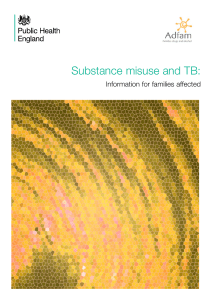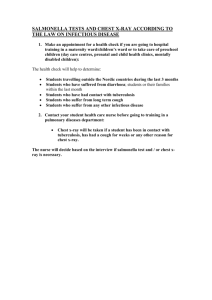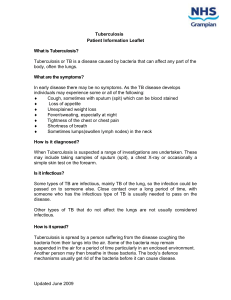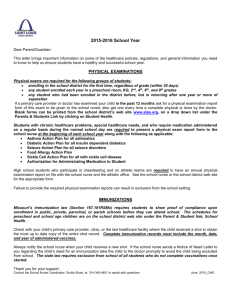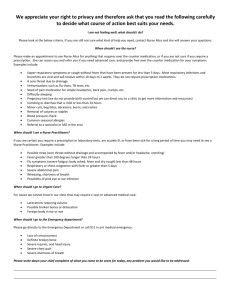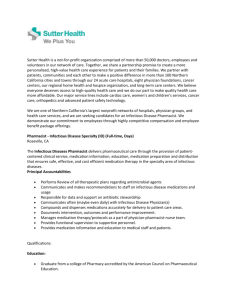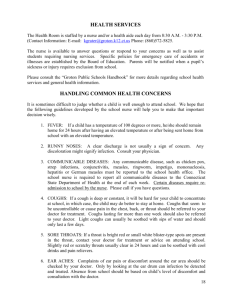Substance misuse and TB: Information for those affected
advertisement
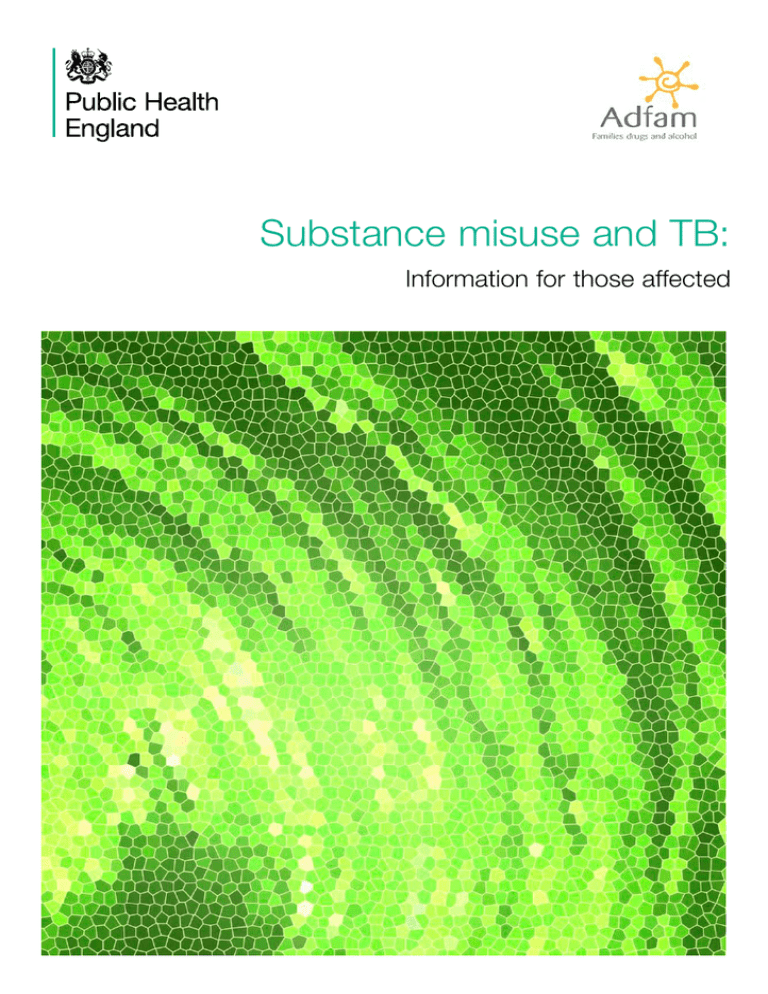
Substance misuse and TB: Information for those affected What is TB and how could I catch it? TB is the short name for an infectious disease called tuberculosis. You can get TB by prolonged and close contact with someone who has TB in his or her lungs. They can pass the germs to other people when they cough. TB can affect any part of the body, but can only be passed on from one individual to another when it is affecting the lungs. TB rates in the UK are on the increase, and individuals who misuse drugs and alcohol are more likely to get the disease compared to the general population. Is my cough TB? It could be a normal cough, or it could be from smoking, another infection or TB. If your cough lasts for more than three weeks, ask to see a nurse or doctor. What are the symptoms of TB? If you have a persistent cough and / or at least two symptoms below, you may have TB. You should ask to see a nurse or doctor urgently. ● Persistent fever ● Heavy sweating at night ● Loss of appetite ● Loss of weight for no reason ● Unusual sense of tiredness and being unwell ● Coughing up blood ● Recent contact with someone who has TB. People with TB don’t all have a cough. TB can occur anywhere in the body not just the lungs. If you are worried about your health ask to see a nurse or doctor. I think I have a cough and two or more symptoms. Do I have TB or not? ● This does not mean that you necessarily have TB. The symptoms could be due to another infection, smoking or drug withdrawal. ● But it is important that you get your symptoms checked out, especially if your cough has lasted more than three weeks. Please note: Just because you have had the vaccination for TB (BCG) does not mean that you cannot get TB! How can TB be diagnosed? ● A doctor or nurse will arrange for you to have some tests. This may involve testing your phlegm and having a chest x-ray. ● You may be referred to a specialist TB or chest clinic for these investigations, or they may be arranged by your GP. Will I have to go to hospital? ● If you have a secure place to live and you are well enough, you can stay at home. ● If you have TB in the lungs and are coughing up phlegm, it usually takes a couple of weeks of treatment before you stop being at risk of being able to pass your infection on to others. If you do not have a place to stay and are at risk of infecting others, you may be kept in a separate room in hospital for these two weeks. In hospital…….. ● If you are on opiate substitution treatment, staff in the hospital will ensure that this treatment will be continued while you are in hospital. ● When you are discharged home, you will be asked to attend a hospital clinic regularly so that your progress can be monitored. Your TB treatment will be supplied free of charge by the TB / chest clinic. Can TB be cured? YES, TB CAN BE COMPLETELY CURED IF YOU TAKE TABLETS REGULARLY FOR THE FULL LENGTH OF TREATMENT, WHICH IS AT LEAST 6 MONTHS Treatment ● You may start treatment in a TB / chest clinic or at home. If you are diagnosed with TB that is infectious to others (not all TB cases are infectious), you may be admitted to hospital and treated till you are no longer infectious (usually 2 weeks). You will then be discharged home to continue with your course of treatment and regular clinic follow-up. ● If you stop taking the tablets, the disease could come back and be more difficult to treat because the TB bacteria could become resistant to the anti-TB drugs. You may become more infectious and pass on the disease to family and friends. Directly Observed Therapy You may be supervised while taking your medication, that is, someone will be responsible for watching you take it. This is to ensure that you are taking the treatment as prescribed to help you get better, prevent the spread of TB to others and to prevent you from developing TB that is resistant to your medication. What happens if I continue drinking alcohol during my treatment for TB? ● The drugs used for treating TB can affect your liver; this can be made worse if you continue drinking heavily – your TB nurse, doctor or key worker will discuss this with you. What if I am receiving treatment for my drug use? ● It is safe to take the two sets of treatment together, as long as the treatment is carefully monitored by a healthcare team. Substitute drugs, such as methadone, and TB medication affect each other. The effect is unpredictable: it could cause drug withdrawal or overdose. Your substitute medication dose may need to be changed. It is extremely important that you allow your healthcare team to monitor this closely, and report any symptoms immediately. It is important that you share any concerns you may have with your doctor / healthcare team – they will have experience of dealing with interactions between medications and will be able to ensure that you are on an appropriate dose of substitute medication. What happens if I am co-infected with Hepatitis B or C, or HIV? ● Your treatment will be monitored more closely because some sideeffects are more likely. Please make sure that you keep all your hospital appointments. Who can I go to for advice / who can I talk to? You will have a TB nurse who will support you during treatment and make sure that you see specialist medical staff regularly. It is very important that you discuss your concerns and anxieties freely with your doctor and members of your healthcare team; they are there to help you get better. Will my views be considered? You will be consulted and your view will be taken into account before making any decisions about your care plan and future. It is very important that you talk to your healthcare team. If you think your treatment is not working properly discuss your concerns with your medical team as they may need to change your medication or make other changes to your care plan. Am I infectious to other people? You are only infectious if you have TB of the lungs and are not taking your medication regularly. After 2 weeks of treatment you will normally become non-infectious. You cannot pass on the infection to other people by sharing the kitchen, toilets, crockery, bed linen etc. If you have TB of the lungs, it is possible that you have been infectious for some time before starting treatment. So it is very important that you tell the healthcare team who you have spent time with so that appropriate screening can be arranged for these people. What if I don’t want my family or friends to know about this? If you don’t want your family / friends to know about this, they will not be told. However, the TB nurse may need to discuss this with you further if you have infectious TB, since your family and friends may need to be checked for TB if you see them regularly. Need to know more? Further information and contacts are available on: PHE website: https://www.gov.uk/government/collections/tuberculosis-andother-mycobacterial-diseases-diagnosis-screening-management-and-data https://www.gov.uk/government/organisations/advisory-council-on-the-misuseof-drugs/about#what-we-do Adfam: Charity working with families affected by substance use www.adfam. org.uk NHS Choices: http://www.nhs.uk/conditions/Tuberculosis/Pages/Introduction. aspx Public Health England 133-155 Waterloo Road Wellington House London SE1 8UG Tel: 020 7654 8000 www.gov.uk/phe Twitter: @PHE_uk Find out more For more information on our work and priorities please visit our website at www.gov.uk/phe. You can also visit our Facebook page at www.facebook.com/PublicHealthEngland and follow us on Twitter (@PHE_uk). © Crown copyright 2013 You may re-use this information (excluding logos) free of charge in any format or medium, under the terms of the Open Government Licence v2.0. To view this licence, visit OGL or email psi@nationalarchives.gsi.gov.uk. Where we have identified any third party copyright information you will need to obtain permission from the copyright holders concerned. Published November 2013 PHE gateway number: 2013277 This document is available in other formats on request. Please call 020 8327 7018 or email publications@phe.gov.uk
